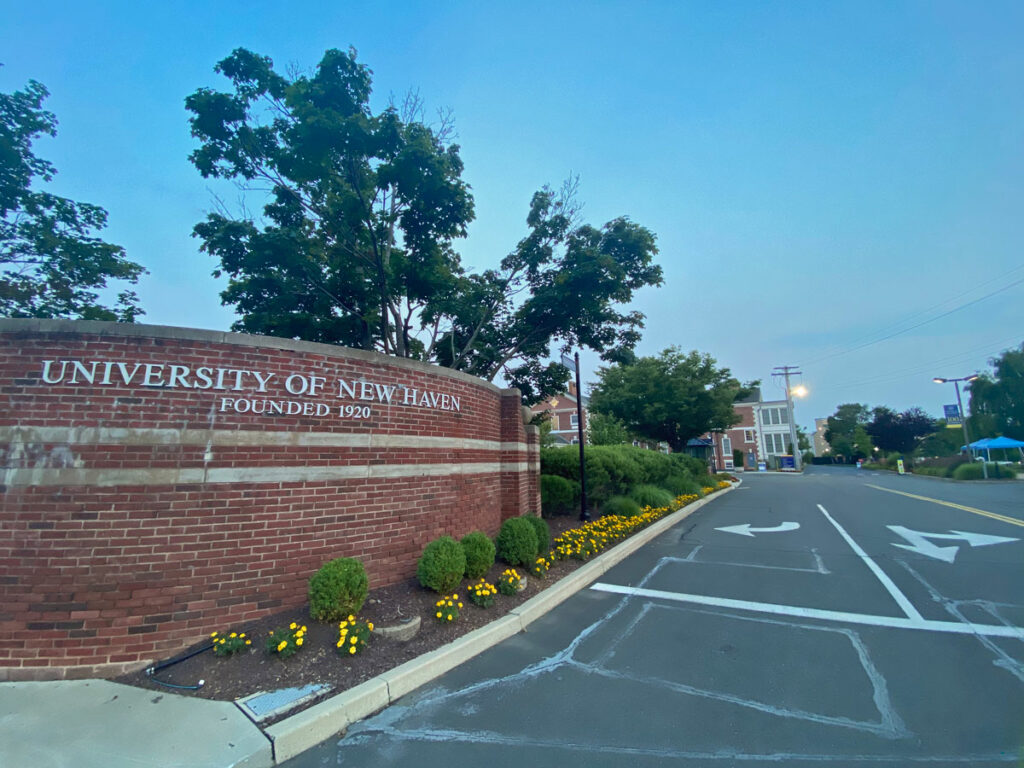Connecticut Colleges Remain Wary About Cannabis On Campus
4 min read
University of New Haven (Nicole McIsaac / ctnewsjunkie photo)
Cannabis may be legal for adults over the age of 21, but Connecticut colleges will have to decide how the new law will apply to their campus environment.
The new law allows adults over the age of 21 to have 1.5 ounces of flower or 7.5 grams of concentrate. Adults can own up to five ounces of cannabis at home or have it locked in the trunk or glove box of their car.
However, colleges are governed by the Drug Free Schools and Communities Act (DFSCA), which prohibits the use or possession of drugs in order to continue to receive the funds that go directly to the school and its students.
Angelo Simoni, senior executive director of compliance, equity and student relations at Connecticut State Colleges and Universities (CSCU), said little is likely to change due to funding under the new cannabis legislation.
“The financial support of all of our students is important and necessary,” said Simoni. “It’s important not to negate that.”
A private, independent college like Quinnipiac University said it would follow the same federal law.
“Changes to the state recreational marijuana law will not affect the university’s policies, as we must comply with federal drug laws under the Drug Free Schools and Communities Act, which requires all higher education institutions to implement alcohol and drug prevention programs that protect the illegal Possession prevents the use and distribution of illicit drugs and alcohol within the facility or in the course of its activities. ”John Morgan, vice president of public affairs, Quinnipiac University.
Many Connecticut universities have a mixed student body. Some are under 21 and some over 21 years old.
“At the University of New Haven, college policy regarding cannabis remains unchanged due to the new state law – the use or possession of narcotics, cannabis, or controlled substances, or possession of drug-related paraphernalia is not permitted on campus or while in residence by the university sponsored off-campus events, ”said Doug Whiting, vice president of marketing and outreach for the University of New Haven. “This policy is described in both our student handbook and our staff handbook and therefore applies to all students and all employees. The guideline applies to the behavior of students both outside and on campus. “
If a minor is caught with cannabis, they will be treated the same as if they were caught under 21 years of age with alcohol. An adult 18-20 years old could be fined $ 50 for the first violation of possession of up to 5 ounces.
Cannabis plants (CTNewsJunkie / photo)
The new law gives police officers a certain amount of discretion when dealing with minors. With the first violation, the police can release juvenile offenders who were caught with less than 5 ounces of cannabis with a written warning or refer them to the youth welfare service. This transfer is mandatory for the second violation. A third offense is considered a criminal offense and may result in arrest.
“In addition, a person who allows a person under the age of 21 to loiter in a cannabis store will be fined $ 1,000 for the first offense with subsequent offenses as a Class B offense,” the governor’s office wrote. “It is a Class D offense for a person under the age of 21 to lie about their age or use a fake ID to buy cannabis. Delivery services must use online ID and age verification. ”
Many schools see this as an opportunity to further educate their students.
Whiting said the University of New Haven will continue to comply with the DFSCA and the university’s substance use task force will offer additional educational programs on cannabis during the academic year.
“If students are in a place where others are using illegal drugs, they can also be held responsible for the violation,” the University of New Haven writes in its student handbook. “Students who are suspected of violating these regulations will be subject to disciplinary action.”
The University of Connecticut is also cautious about ensuring that its students continue to follow the measures already in place until the school has made a decision about student use and ownership.
UConn spokeswoman Stephanie Reitz said the school is still reviewing the details of newly passed laws and the minimum age for ownership.
“UConn Student Affairs is reviewing how these issues connect with their work on enforcing the student code of conduct, guiding residential assistants in dormitories, and related issues,” Reitz said. “These reviews are still ongoing and groups are actively participating in the discussions.”
Simoni said the CSCU colleges will continue to follow the same disciplinary measures.
“If a student were caught with a small amount of cannabis, they would most likely not be kicked out or expelled from school,” said Simoni. “But they would still have to follow the same behavior that applied to using or possessing drugs on campus.”
Some universities are not making any changes to their policies.
“The university’s policy on on-campus cannabis use remains unchanged,” said Steven Scarpa, Wesleyan’s media and public relations manager. “Wesleyan is committed to creating a safe and healthy environment for all members of our student community.”
What do students think?
“I think by the time you’re of legal age you should have Marjuanna on campus,” said Kelly Schneider, an Eastern Connecticut State University student. “It’s legal now, so it should be allowed on a college campus.”
Eastern Connecticut State University recently announced that it will launch one of the state’s first hemp-growing shortages this fall.
“Depending on what the marijuana is used for, I think it’s okay for a student to own it in a college setting,” said Joanna Haligowski, a Quinnipiac University student. “Marijuana has many medicinal benefits, and if it helps a student, I think it’s okay.”








 Protected by Patchstack
Protected by Patchstack